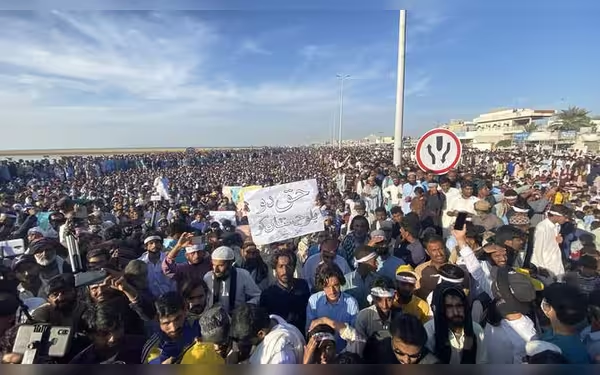Saturday, October 5, 2024 07:30 AM
Balochistan Development: Challenges and Opportunities for Progress
- Federal government allocates Rs 130 billion for Balochistan development.
- Local ownership and community involvement are crucial for effective development.
- Emerging middle class in Balochistan demands recognition and opportunities.
 Image Credits: thefridaytimes
Image Credits: thefridaytimesBalochistan faces socio-economic challenges despite Rs 130 billion allocation; local involvement and education are key for true progress.
Balochistan, a province rich in resources yet plagued by socio-economic challenges, has long been at the center of discussions regarding development and governance in Pakistan. On September 20, 2024, Ahsan Iqbal, the Federal Minister for Planning and Development, expressed his optimism that Balochistan would transform into the most prosperous province in Pakistan within the next 15 to 20 years. This ambitious claim comes alongside the federal government's allocation of Rs 130 billion for development in Balochistan, nearly double the amount allocated to Punjab and more than any other province. However, the question remains: will this influx of funds truly address the underlying issues faced by the people of Balochistan?
Historically, the government has attempted to resolve the province's challenges through financial investments, believing that development funds would magically solve structural problems. Yet, this approach has often overlooked the crucial aspect of local ownership and community involvement. Despite the significant financial resources directed towards Balochistan, the province continues to rank lowest in the Human Development Index among all provinces in Pakistan. This raises a critical question: are we not guilty of putting the cart before the horse by pouring money into the province without a clear understanding of its core issues and the needs of its people?
Infrastructure development has been a primary focus, with projects such as seaports, roads, and gas pipelines being prioritized. While efficient infrastructure can indeed foster economic growth, it is essential to recognize that the importance of such projects varies based on the unique conditions and strategic priorities of each region. Many Baloch people remain trapped in cycles of poverty and illiteracy, raising doubts about the economic viability of these initiatives. Policymakers must evaluate the trade-offs and optimize resource allocation to address urgent local needs, such as schools, vocational centers, hospitals, and job creation in traditional sectors.
Education plays a pivotal role in fostering a functioning economy and empowering citizens. An educated populace is less susceptible to poverty and violence, and more capable of managing local resources and development projects. The example of China, which implemented free, compulsory education in the early 1980s, illustrates the transformative power of investing in human development. Such investments not only eliminate barriers to freedom and self-fulfillment but also pave the way for a more prosperous future.
However, the lack of audit and accountability regarding development funds remains a significant issue. In 2021, a high-profile case involving the embezzlement of Rs 2.25 billion by a former Finance Secretary highlighted the systemic corruption that plagues the province. Additionally, reports of incomplete projects, such as the 29-km long Turbat-Buleda road, further underscore the need for transparency and accountability in the allocation of resources.
The current situation in Balochistan has prompted a parliamentary consensus to engage in dialogue with the local population. Sardar Akhtar Mengal's recent resignation from the national assembly serves as a wake-up call for civilian leadership to address the pressing issues in the province. Despite his previous role as chief minister, Mengal's contributions to human and infrastructure development in his constituency have been called into question.
Amidst these challenges, a new middle class is emerging in Balochistan, driven by remittances and professional education. The youth of Balochistan, proud of their identity and culture, are increasingly aware of the marginalization they face from the state. The influx of mega projects has led to mass migration, creating an identity crisis among locals. This sense of betrayal and deprivation has fueled the rise of armed groups, such as the Balochistan Liberation Army (BLA), which have resorted to violence in response to their grievances.
The situation in Balochistan calls for a reevaluation of development strategies. Merely maintaining a façade of democratic representation will not suffice. The youth of Balochistan deserve a future where their voices are heard, their needs are met, and their potential is realized. It is imperative for the government to prioritize human development, foster local ownership, and ensure accountability in the use of resources. Only then can Balochistan hope to break free from the cycle of poverty and violence, paving the way for a brighter future for its people.













